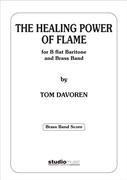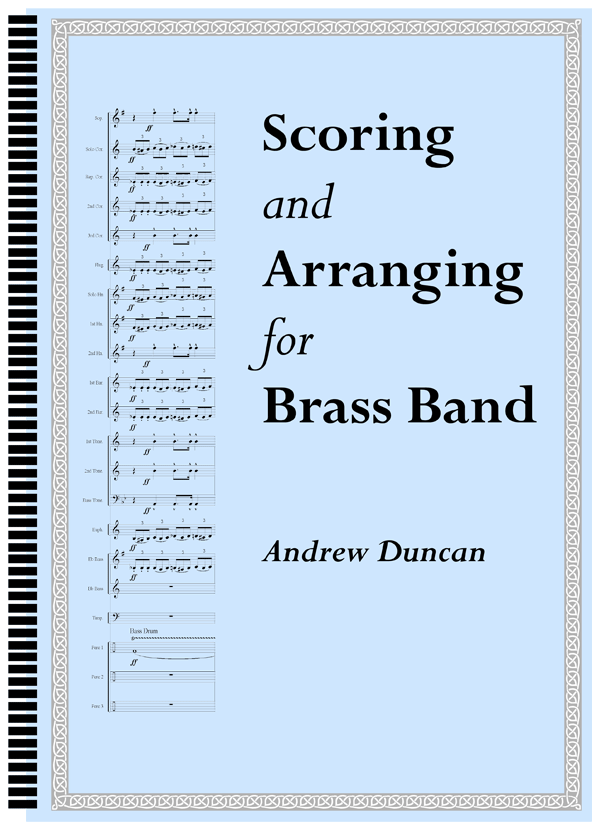Results
-
 £54.99
£54.99Hymnus Antverpiae (Brass Band - Score and Parts) - Van der Roost, Jan
This hymn was commissioned by "Antwerpen 93". And this city, on the banks of the river Schelde has been nominated "Cultural Capital of Europe" for 1993. The work-group "animatie" took the initiative and commissioned a hymn, which -as the finale to a grand open-air event on 27th March- was premired by hundreds of musicians from all over Europe. Philippe Langlet (France) was the conductor at this majestic occasion. Musically speaking the piece can no doubt be labelled easy. Indeed it is meant to represent a hymn, playable by all in different instrumental combinations. Consequently a variable instrumentation was chosen and a type of music, which by native is easily accessible and uncomplicated. The conductor is free -in the instrumentation- to score this piece according to his own taste. It is perhaps advisable to use the sharp brass in the forte parts, in order to make the range in the sound of the orchestra as colourful as possible. The percussion parts are not absolutely essential, so that the hymn can also be performed without percussion.Duration: 4:00
Estimated dispatch 7-14 working days
-
 £64.95
£64.95HEALING POWER OF FLAME, The (B flat Baritone Solo with Brass Band) - Davoren, Tom
As the progressive rock band Transatlantic quote in their song of the same name, We All Need Some Light. Since the dawn of man, fire has been our most essential companion. A steadfast provider, it is a source of comfort, assurance and safety. On the other hand though, fire is one of natures most brutal and unpredictable forces; erratic, entrancing, devastating and spectacular. Ones personal 'fire' finds us in a multitude of ways and at once stage or another, everyone will search for The Healing Power of Flame. Duration: 10:00
Estimated dispatch 7-14 working days
-
 £50.90
£50.90I KNOW WHY (Brass Band) - Smith, Sandy
Duration: 2'54". Grade: easy/medium. Recorded on OBRCD945 Flyin' to the Skies (Black Dyke Band). Part of the Essential Glenn Miller collection.
Estimated dispatch 7-14 working days
-
 £54.20
£54.20IN THE MOOD (Brass Band) - Garland, Joe - Smith, Sandy
Medium. Part of the Essential Glenn Miller collection.
Estimated dispatch 7-14 working days
-
 £54.20
£54.20SONG OF THE VOLGA BOATMEN (Brass Band) - Smith, Sandy
Grade: Medium. Part of the Essential Glenn Miller collection.
Estimated dispatch 7-14 working days
-
 £30.00
£30.00Black Bottom Stomp - Jelly Roll Morton
Ferdinand Joseph LaMothe, professionally known as Jelly Roll Morton, was an American ragtime and early jazz pianist, bandleader and composer who started his career in New Orleans, Louisiana. Widely recognised as a pivotal figure in early jazz, Morton is perhaps most notable as jazz's first arranger, proving that a genre rooted in improvisation could retain its essential spirit and characteristics when notated. His composition "Jelly Roll Blues" was the first published jazz composition in 1915. Morton is also notable for writing such standards as "King Porter Stomp", "Wolverine Blues", "Black Bottom Stomp", and "I Thought I Heard Buddy Bolden Say". Notorious for his arrogance and self-promotion, Morton claimed to have invented jazz outright in 1902, much to the derision of fellow musicians and the critics. At the age of fourteen, Morton began working as a piano player in a brothel (or, as it was referred to back then, a sporting house). In that atmosphere, he often sang smutty lyrics and took the nickname "Jelly Roll". While working there, he was living with his religious, church-going great-grandmother; who he convinced that he worked as a night watchman in a barrel factory. After Morton's grandmother found out that he was playing jazz in a local brothel, she kicked him out of her house and told him that "devil music" would surely bring about his downfall. Born in downtown New Orleans, Louisiana, his exact birth date differs depending to whichever source you want to believe; his half-sisters claimed he was born in September 1885, but his World War 1 draft card showed September 1884 and his California death certificate listed his birth as September 1889. He died in 1941 in Los Angeles.
-
 £30.00
£30.00Red Hot Pepper Stomp - Jelly Roll Morton
Ferdinand Joseph LaMothe, professionally known asJelly Roll Morton, was an Americanragtimeandearly jazzpianist, band leader andcomposer who started his career inNew Orleans,Louisiana. Widely recognised as a pivotal figure in earlyjazz, Morton is perhaps most notable as jazz's first arranger, proving that a genre rooted in improvisation could retain its essential spiritand characteristics when notated. His composition "Jelly Roll Blues" was the first published jazz composition in 1915. Morton is also notable for writing suchstandardsas "KingPorter Stomp", "Wolverine Blues", "Black Bottom Stomp", and "I Thought I HeardBuddy BoldenSay". Notorious for his arrogance and self-promotion, Morton claimed to have invented jazz outright in 1902, much to the derisionof fellow musicians and the critics. At the age of fourteen, Morton began working as a piano player in a brothel (or, as it was referred to back then, a sporting house). In that atmosphere,he often sang smutty lyrics and took the nickname "Jelly Roll". While working there,he was living with his religious, church-going great-grandmother; who he convinced that he worked as a night watchman in a barrel factory. After Morton's grandmother found out that he was playing jazz in a local brothel, she kicked him out of her house and told him that "devil music" would surely bring about his downfall. Born in downtown New Orleans,Louisiana, his exact birth date differs depending to whichever source you want to believe; his half-sisters claimed he was born in September 1885 but his World War 1 draft card showed September 1884 and his California death certificate listed his birth as September 1889. He died in 1941 in Los Angeles.
-
 £32.99
£32.99Christmas Day - Gustav Holst arr. J Knight
This Gustav Holst piece contains three Carols: Good Christian Men, Rejoice, God Rest ye Merry Gentlemen and Come, ye lofty, come, ye lowly, (Old Breton Melody) with a little The First Nowell thrown in for good measure. It has been arranged here for the full brass band and has had light percussion parts added to complement. It starts with the band in full chord and then pairs down to solo instruments playing Good Christian Men monophonically. This piece has all of the essential elements of Holst's harmony and tension while retaining the joy of Christmas. It ends quietly and reflectively and works very well in large acoustics such as a Church building or large town hall.
Estimated dispatch 5-9 working days
-
 £75.00
£75.00As Above, So Below - Jay Capperauld
An original composition for brass band and brass quintet by Jay Capperauld was commissioned by John Wallace and The Wallace Collection with the support of the PRS Foundation's Beyond Borders. This major work enjoyed its world premiere at The Cumnock Tryst on 30 September 2017 at Cumnock Old Church, performed by The Wallace Collection and Dalmellington Band, conducted by Martyn Brabbins.If you would like to perform this work, please don't hesitate considering The Wallace Collection to provide the brass quintet elements - if you would like to discuss potential performances, please contact us on [email protected] NotesBased on the Hermetic maxim "As Above, So Below", the phrase comes from the cryptic text of The Emerald Tablet, which was purportedly written by a mysterious character who is thought of as an amalgamation of Greek and Egyptian Gods, Hermes Trismegistus. The text first appears in Arabic between the 6th and 8th Centuries and is intended to outline the primitive and hidden sources that constitute the basis of all matter in the universe. The phrase "As Above, So Below" implies an essential "oneness" of all matter and a correlation between the physical elements and supernatural entities that make up our surroundings. The philosophies expressed within The Emerald Tablet have become a founding principle of Alchemy, Occultism, Witchcraft, Theosophy and various other ancient gnostic systems of belief, and this work attempts to explore these forms of so-called "secret knowledge" in a ritualistic trance-like Adagio steeped in the esoteric.The Brass Band is placed at the centre of the stage while the solo Brass Quintet are spread antiphonally around the concert hall and are placed above both the Brass Band and the audience in an attempt to create a direct dialogue between the Above and the Below. Therefore, the piece endeavours to explore the meaning behind the text of The Emerald Tablet as well as the phrase 'As Above, So Below' in a music context while giving particular attention to the 'SOLVE' (Latin for 'Separate' which correlates to the Above) and 'COAGLUA' (Latin for 'Join Together' which relates to the Below) that is depicted in the image of the Baphomet by the French occultist author, Eliphas Levi, which is a visual representation of the phrase 'As Above, So Below'.Additional Note of InterestIt was not until the work was complete that the role of the main melody became clear when an unexpected and inadvertent correlation between this melody and that of the Latin Dies Irae presented itself. The plainchant nature of As Above, So Below's melody became a defining feature of the piece and when compared to the melody of the Dies Irae (a similar melody reminiscent of that contained within As Above, So Below), some interesting and unsettling implications unveiled themselves.The findings of a comparison can be interpreted as follows:Both melodies adhere naturally to the plainchant idiom, which in itself strongly relates to a supernatural (or quasi-religious) element in both cases.Both melodies originate in the key of D; the Dies Irae resides in the Dorian Mode on D while the As Above, So Below melody inhabits the D Octatonic Scale.Both melodies can be divided into three distinct phrases, although the melody to As Above, So Below can be divided into three phrases in a number of ambiguous ways.The most striking and unnerving connection is that, by pure chance, the Latin text to the Dies Irae fits perfectly under both melodies giving an entirely specific context to how the melodies are perceived.By understanding the As Above, So Below melody as an alternative to that of the Dies Irae and by interpreting it in the same context, the connotations of the Dies Irae's otherworldliness, and the suggestion of a dialogue with the supernatural and death adds a richer dimension to the As Above, So Below melody which in turn solidifies the esoteric concept of this work.In conclusion, this unanticipated and purely accidental relationship between both melodies is worthy of note more so from an emotional and contextual perspective rather than from any analytical evaluation concerning the music itself - it is the circumstance of the so-called "secret knowledge" that has presented itself within the inner workings of As Above, So Below.
In Stock: Estimated dispatch 3-5 working days
-
 £30.00
£30.00Scoring and Arranging for Brass Band - Andrew Duncan
The essential reference book for brass band composers and arrangers.Scoring and Arranging for Brass Band is a must for anyone wanting to begin writing for the British style brass band. It'sa fully illustrated book with many solutions, suggestions and tips on all aspects of scoring and arranging for brass band.The book has detailed information about each of the brass band instruments,the different sections and also includes a focus on thePercussion and Timpani sections.There is also an introduction to self-publishing and the things to consider concerningcopyright law.For an in depth review of the book by Iwan Fox of 4barsrest follow this article link to the4BarsRestwebsite.
In Stock: Estimated dispatch 3-5 working days
